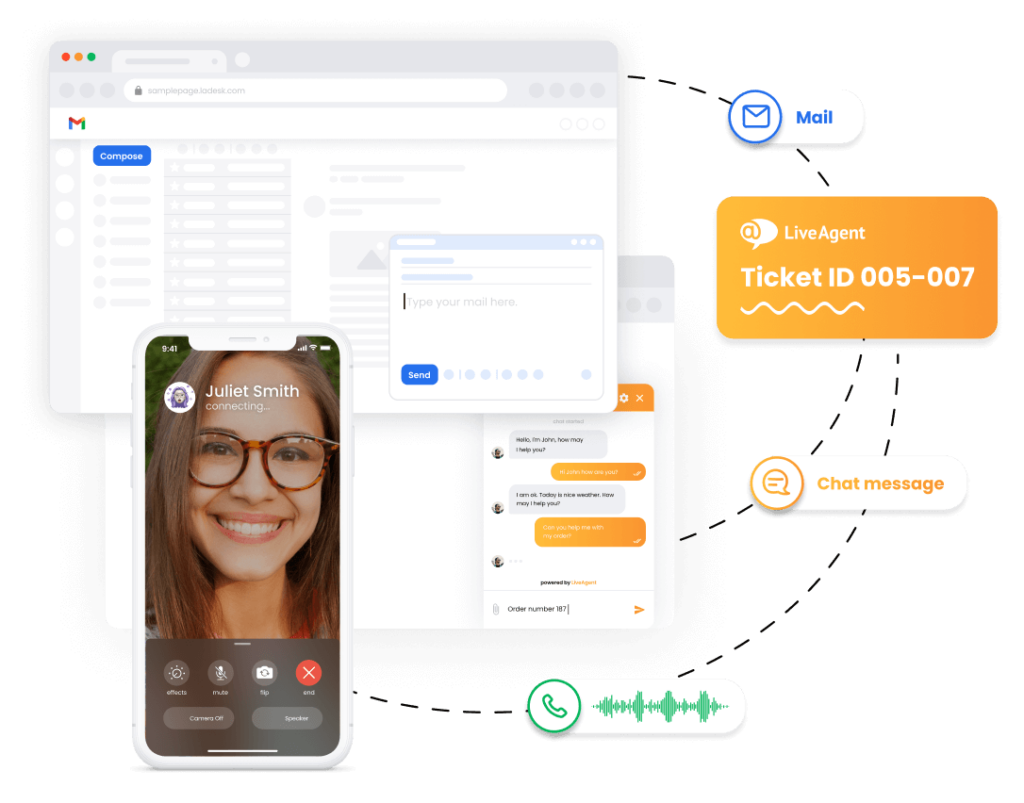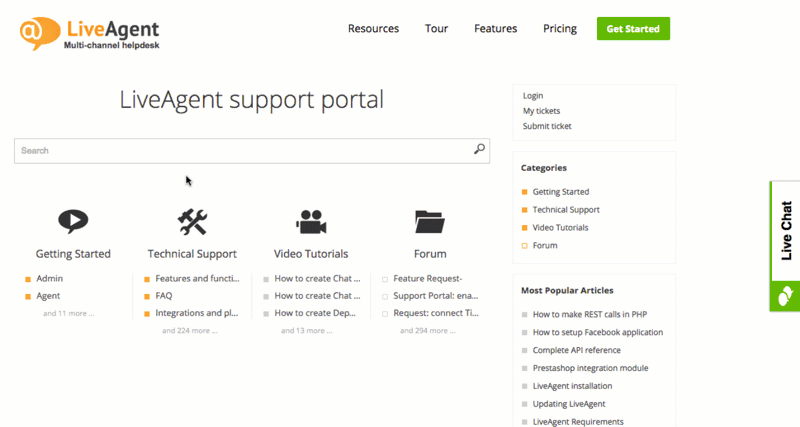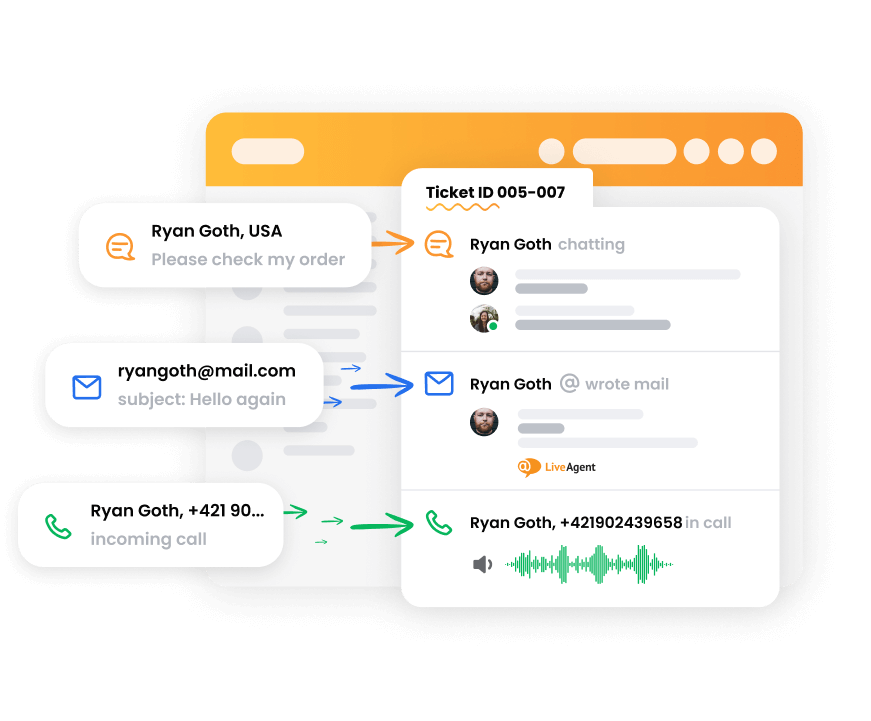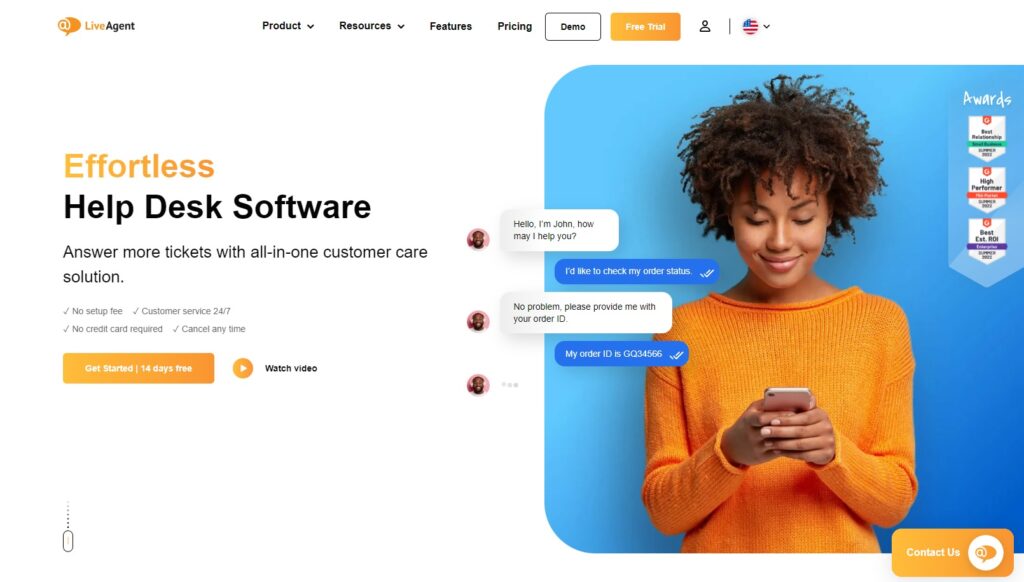In a world where customer interactions can make or break a brand, understanding the distinction between customer service and customer support is crucial. Many businesses often conflate these terms, yet they represent two unique facets of customer interaction that can shape a customer’s overall experience.
Customer service focuses on the overall experience and satisfaction, while customer support zeros in on resolving specific technical issues. The nuance in their differences affects how businesses approach customer engagement and problem-solving strategies.
In this article, we will explore the key differences between customer service and customer support, highlight their respective roles, and provide actionable tips to enhance both experience. Moreover, we’ll demonstrate how LiveAgent stands out as the optimal solution for addressing these important aspects of customer interaction.
Table of Contents
Defining customer service
Customer service encompasses all interactions a business has with its customers. It aims to help them maximize the value of a product or service throughout their journey. This includes assisting with placing orders, resolving complaints, and managing account issues like billing and delivery.
Key activities in customer service:
- Answering inquiries
- Providing solutions and recommendations
- Managing account issues
- Resolving complaints
Unlike customer support, which often focuses on tackling technical issues, customer service takes a proactive approach. It seeks to identify potential concerns before they arise. The goal is to enhance trust and satisfaction, fostering long-term relationships.
Customer service is crucial for customer satisfaction and retention. It plays a vital role in creating positive customer experiences and ensuring customer loyalty. By addressing customer needs, businesses can significantly influence the overall experience and drive retention rates.
For businesses looking to excel in customer service, LiveAgent is an excellent choice. It offers a comprehensive platform to manage customer interactions, ensuring seamless service and support.
What is customer support?
Customer support is a vital service offered by businesses to ensure customer satisfaction and product efficiency. It mainly involves technical assistance, addressing customer questions, and resolving any issues or complaints related to a product or service. Unlike proactive approaches, customer support often works reactively. This means support teams respond to customer requests for help when users encounter problems.
Key aspects of customer support include:
- Technical assistance: Helping users navigate product functionalities.
- Problem resolution: Addressing specific issues users face.
- Education: Providing training to optimize product use.
Excellent customer support not only enhances the overall customer experience but also boosts satisfaction and loyalty. This, in turn, contributes significantly to business growth. A reliable tool for managing customer support effectively is LiveAgent. It enables businesses to provide timely and efficient support, ensuring positive customer experiences and meeting customer expectations.
Key differences between customer service and customer support
Understanding the distinctions between customer service and customer support is essential for improving customer satisfaction and business performance. Let’s explore their unique roles and functions.
Focus on overall experience vs. technical assistance
Customer service aims to enhance the overall experience. It engages with customers at every stage, from choosing a product to after-sales service, ensuring satisfaction and building long-term relationships. This is where customer service representatives shine, being the friendly faces or voices that handle general inquiries and help foster positive customer experiences.

On the other hand, customer support zeroes in on technical assistance. When customers face technical troubles, customer support representatives are ready with specialized knowledge to solve complex issues. They focus on quick, accurate resolutions that keep customers satisfied and products functioning efficiently.
Relationship-building vs. issue resolution
Customer service and customer support have distinct objectives. Customer service is about relationship-building. It focuses on providing continuous support that begins before a purchase and extends long after, nurturing ongoing connections with customers. This leads to customer loyalty and satisfaction, which are crucial for business growth.
Conversely, customer support prioritizes issue resolution. After a purchase, if problems arise, support teams respond swiftly to solve these issues. Their main goal is to resolve customer problems effectively, ensuring customers can continue to use the product without hitches.
Both customer service and support are instrumental in creating a positive customer journey. Skills like proficient communication and active listening are necessary for both roles, enabling representatives to clarify customer concerns and complex ideas seamlessly.
Proactive approach vs. reactive approach
Customer service often adopts a proactive approach. It means reaching out to customers before issues occur, offering help, and collecting feedback to improve products and services. This approach can reduce the volume of customer inquiries, enhancing efficiency and demonstrating care for customers.
Customer support typically follows a reactive approach. They address issues only after they arise and customers request help. While this approach is essential for immediate problem-solving, it tends to be more transactional, focusing on fixing problems as they occur.
A proactive strategy can foster stronger relationships and improve satisfaction, encouraging long-term customer retention. In contrast, reactive support provides necessary assistance, focusing on delivering fast resolution times for existing issues.

The importance of customer service
It helps maintain and increase customer retention, bringing in new customers and ensuring existing ones keep coming back. When customers have positive experiences with a company, they are more likely to remain loyal. In fact, 91% of customers make repeat purchases when they receive excellent service.
Positive customer service experiences significantly boost customer loyalty. Up to 94% of customers will recommend a company if they have received superb service. This not only enhances the business’s public image but also can lead to revenue growth between 4% and 8%.
Conversely, poor customer service can cause significant harm. A staggering 91% of dissatisfied customers will leave a company without complaining, which damages the business’s reputation and finances.
Enhancing customer satisfaction
Good customer support starts with empathy and understanding. When customers feel understood and valued, they form stronger relationships with the business. This inevitably leads to increased loyalty.
Offering support resources, like FAQs and access to knowledgeable representatives, helps customers find solutions more easily. When businesses train employees effectively in customer service skills and product knowledge, the quality of support improves, boosting satisfaction.
Building long-term loyalty
Exceptional customer service is a powerful tool for building a brand’s image and securing customer retention. A solution-focused approach keeps customers happy and committed to the brand. This strategy ensures that customer expectations are not only met but exceeded, leading to lasting loyalty.
Strong customer service is crucial in nurturing relationships. It’s important across all industries to maintain these relationships for business success. Personalized support and assistance cater to individual needs, driving satisfaction and loyalty. This personalized approach also contributes to overall business growth.
Contributing to brand reputation
The experience a customer has is as crucial as the products or services offered. Eighty-eight percent of customers base their perception of a brand on the quality of its service. Bad experiences can lead to customer churn, with many quick to abandon a brand after just three negative interactions.
Negative experiences are often shared widely online, making it vital for businesses to prioritize high-quality service. Effective customer service enhances brand equity, encouraging more referrals and boosting sales.
Lastly, positive customer interactions foster trust and create durable bonds between brands and customers, significantly improving brand reputation.
The role of customer support
Customer support is vital for any business that aims for long-term success. It ensures customers are satisfied and can effectively use the products or services they’ve purchased. Unlike customer service, which may be more general, customer support is often reactive and short-term. It focuses on addressing technical assistance, resolving problems, and providing training or education.
Customer support is essential for building strong customer relationships. When customers know they can rely on support to fix issues, it boosts their satisfaction and loyalty. This trust helps create a positive customer experience that keeps customers coming back.
Addressing technical inquiries
When it comes to technical issues, customer support shines. These representatives focus on resolving problems that need specialized knowledge. If a customer faces a technical hurdle, support agents listen to their symptoms, attempt to replicate the issue, and work towards a swift resolution.
Unlike customer service representatives, customer support agents are highly trained with technical expertise. Their role in troubleshooting is crucial. It directly affects customer satisfaction by reducing frustration and downtime. Through gathering and acting on customer feedback, support teams can enhance product quality and customer experiences significantly.
Providing timely solutions
Customer support teams are the first point of contact when dealing with technical problems. Their goal is clear: resolve issues promptly to minimize customer frustrations. Effective troubleshooting not only fixes immediate issues but also prevents future ones.
Documenting each interaction is key. It helps identify recurring issues and develop proactive solutions. This feedback loop contributes to better product development, highlighting common problems and potential improvements.
Enhancing product understanding
Training is a cornerstone for improving customer support. Support agents need ongoing education in both hard and soft skills. Interpersonal skills like communication, empathy, and active listening are vital for enhancing customer interactions.
Regular updates on new product releases or changes empower employees to tackle customer inquiries effectively. Training shouldn’t just be about scripts; it should promote knowledge and autonomy in making service decisions. Well-trained agents can offer personalized service, which is crucial as 66% of consumers expect brands to recognize their individual needs.
Types of customer support
Support can include troubleshooting, maintenance, and handling upgrades and installations. Today’s customer service uses both digital channels, like email and chat, and live agents through call centers or in-person support. Key skills for support roles include problem-solving, active listening, and strong communication. Successful customer support combines these approaches to address customers’ unique needs comprehensively.
Self-service options
Self-service support lets users find solutions independently. Resources like knowledge bases, FAQs, and online tools reduce dependence on direct support. Customer service leaders have noted a 65% drop in support calls thanks to self-service. Help centers, portals, and community forums offer quick answers, minimizing the need for personalized help. Around 75% of customers prefer self-service for simple issues, showing its effectiveness for straightforward inquiries. However, self-service should be optional, respecting those who still value personal interaction.

Live chat assistance
Live chat provides real-time help, allowing instant responses. It boosts customer loyalty, with 52% of customers favoring companies offering this service. Agents can handle multiple chats simultaneously, improving efficiency and resolution speed. Transcripts from these chats are saved, ensuring quality assurance and keeping interaction records. Despite providing immediate support, complex questions might still need follow-up emails for thorough answers.

Social media engagement
Eighty-two percent of service companies use social media for customer interaction. Some, 32%, delegate social support to marketing teams, blending marketing with customer service. About 24% share these tasks between both teams. Social media allows for direct customer interaction on popular platforms, increasing responsiveness and transparency. Resolving issues publicly can showcase a company’s dedication to customer satisfaction, boosting brand perception.

Phone and email support
Phone support covers about 32% of customer inquiries in B2B settings, with 87% using this method. It allows for immediate help with complex issues through direct conversation. Email offers low-cost, non-intrusive communication, accessible anytime for non-urgent queries. Ticketing systems and CRM tools manage follow-up emails, improving interaction tracking. Customer service uses both phone and email to meet diverse customer needs and preferences.

For businesses aiming to enhance customer support effectively, tools like LiveAgent can unify these diverse communication channels, ensuring a seamless customer service and support experience.
Best practices for customer service
Ensuring excellence in customer service involves a set of best practices that support effective communication, active listening, and creating a customer-centric culture. Trained employees can efficiently resolve concerns and enhance customer satisfaction. Let’s explore these best practices in detail.
Effective communication strategies
Effective customer support agents need excellent communication skills. These skills help them resolve customer issues and create positive interactions. Active listening and empathy are key components. They help agents understand and resonate with customer concerns.
Providing a friendly customer service experience involves listening actively and validating customer issues. This makes customers feel valued. Problem-solving and being proactive help agents address issues before they escalate. Maintaining professionalism, especially during heated exchanges, ensures agents manage situations calmly.
Prioritizing active listening
Active listening allows customer service agents to fully grasp customers’ feelings and needs. This practice improves overall service quality. When agents actively listen, they build stronger connections. Customers then feel valued and understood.
Training programs should prioritize active listening. This helps agents respond thoughtfully to inquiries. Techniques like paying attention to words, tone, and body language are crucial. Trust builds through active listening, as customers feel acknowledged.
Creating a customer-centric culture
A customer-centric culture aligns service goals with broader company objectives. It ensures a unified approach to achieving customer satisfaction. Ongoing training empowers service teams with new skills and tools to enhance experiences.
Encouraging a proactive mindset in customer service representatives ensures needs are met before they escalate. Building strong relationships through personalized engagement boosts customer loyalty. This culture values transparency and empathy, which are key in addressing feedback.
Business tools, like LiveAgent, can further advance customer service efforts. LiveAgent connects different departments, ensuring consistent, quality interactions. This fosters customer satisfaction by addressing queries swiftly and accurately. By adopting these best practices and utilizing tools like LiveAgent, businesses can deliver exemplary service and support.
Best practices for customer support
Customer support is crucial in a business’s success. To ensure a high level of efficiency and effectiveness, support should be quick and easy for customers to access. A customer-centric culture is important. It prioritizes customers’ needs and experiences in every interaction. In addition, personalizing support boosts customer satisfaction and loyalty. It makes customers feel valued and understood.
Regular training for support teams is vital. It helps maintain high standards and equips agents to handle different interactions. Continuously measuring and improving support processes also helps meet evolving customer expectations.
Utilizing support tools and software
In today’s fast-paced world, using the right tools and software is essential. Email is an effective tool for handling support queries. Shared inboxes reduce clutter and improve efficiency, especially with high email volumes. A self-service knowledge base like FAQs can save time and allow customers to find answers on their own.
Live chat is gaining popularity because it allows quick resolution of issues. It also aids informed decision-making. Effective support needs well-trained staff and technical systems to manage queries efficiently. Additionally, customer support software helps track and manage interactions, supporting a more customer-focused approach. LiveAgent, for instance, offers extensive features to streamline customer support and enhance customer interactions.

Training support teams regularly
To enhance customer satisfaction, prioritize regular training for support teams. Training should cover both hard and soft skills, like active listening, empathy, and communication. This makes agents better at handling interactions and ensures they stay updated on products and company protocols.
By empowering agents with product knowledge, they can answer inquiries and solve technical issues effectively, reducing customer frustration. Developing a blend of customer service and technical skills in the team fosters a customer-centric approach, greatly enhancing the customer experience.
Encouraging feedback and improvement
Gathering regular customer feedback is key to improving support strategies. Feedback helps identify what works and what needs change. Insights from customers can guide changes to enhance the customer journey and satisfaction.
Support staff should also engage in the feedback process. This highlights challenges and identifies resource needs for better service. Some ways to collect feedback include surveys, suggestion boxes, and regular feedback sessions. Utilizing insights from social media and feedback forms can drive continuous improvements.
In summary, focusing on best practices, using the right tools, prioritizing regular training, and actively seeking feedback are essential for exceptional customer support. Choose tools like LiveAgent to streamline and enhance your customer support efforts, creating positive experiences and long-term customer loyalty.
Upgrade your customer interactions with LiveAgent!
Optimize service and support with our reliable, easy-to-use platform.
Conclusion
Understanding the difference between customer service and customer support is crucial for businesses aiming to enhance their customer interactions. Customer service is a proactive and strategic function focused on building long-term relationships and fostering loyalty. It addresses the entire customer journey, ensuring customers derive ongoing value.
On the other hand, customer support is more reactive, concentrating on swiftly resolving technical issues and direct customer inquiries. While both play distinct roles, achieving a balance between them can lead to increased customer satisfaction and business growth.
To effectively manage customer interactions, businesses should consider tools that excel in both areas. LiveAgent offers a comprehensive solution, providing excellent support for both customer service and customer support needs. With features designed to personalize interactions and resolve issues swiftly, LiveAgent is ideal for fostering positive customer experiences.
For a firsthand experience, consider trying LiveAgent’s 30-day free trial to see how it can improve your customer satisfaction and support strategies. By harnessing these insights and tools, your business can effectively meet customer expectations and drive revenue growth.
Frequently Asked Questions
What is the difference between customer support and customer service representatives?
The role of customer support is primarily to help customers solve specific issues with a product or service, often related to technical problems. On the other hand, customer service representatives interact with customers to handle complaints, process orders, and provide information about an organization's products and services.
How have customer service and customer support evolved?
They have evolved from face-to-face and phone-based interactions to include digital platforms like live chat, social media, and email. The use of technology, particularly AI and machine learning, is now common in serving customers, such as in chatbots and automated responses. Additionally, there's a greater focus on proactive support and personalization, where companies anticipate customer needs and offer solutions before problems arise.
What is the difference between customer care and customer service?
Customer service assists customers before, during, and after purchases, while customer care involves managing relationships proactively. It encompasses customer service but also includes addressing needs, maintaining communication, and building closer ties. Customer service is a single touchpoint, whereas customer care signifies long-term engagement in the customer journey.
What is the difference between customer service and general support?
Customer service specifically deals with assisting customers in all stages of a purchase, focusing on enhancing satisfaction and solving any purchasing-related customer issues. General support can cover a broader range of areas, not limited to customers. It can include assisting staff, troubleshooting technical issues, or providing help with various organizational services or products, extending beyond the purchasing process.

 Български
Български  Čeština
Čeština  Dansk
Dansk  Deutsch
Deutsch  Eesti
Eesti  Español
Español  Français
Français  Ελληνικα
Ελληνικα  Hrvatski
Hrvatski  Italiano
Italiano  Latviešu
Latviešu  Lietuviškai
Lietuviškai  Magyar
Magyar  Nederlands
Nederlands  Norsk bokmål
Norsk bokmål  Polski
Polski  Română
Română  Русский
Русский  Slovenčina
Slovenčina  Slovenščina
Slovenščina  简体中文
简体中文  Tagalog
Tagalog  Tiếng Việt
Tiếng Việt  العربية
العربية  Português
Português 




